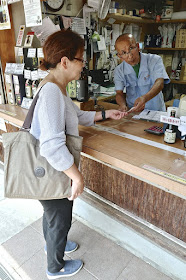As iconic as geishas and sushi, sake has been an important part of Japanese culture and traditions for centuries. There are several saké - Japanese fermented rice alcohol - brewers near Tokyo, who preserve the ancient tradition while practicing their craft. Some say the origins of saké date back to 4800 BC China, however it wasn't until 300 BC that saké came to Japan with wet rice cultivation. Since then, it has become synonymous with the nation. Inspired by The Birth of Saké, a documentary we saw a number of years ago on the making of sake, we hired a guide for the day to learn about the different types of sake and how they are made. The first brewery we visited with our wonderful guide Chika was Ozawa Shuzo, located along the upper stretches of the Tama River, about a 2-hour drive from the centre of Tokyo, surrounded by nature and deep forest. Founded in 1702, the brewery is located in Okutama, known for its clear spring waters and also for being the oldest sake brewery in the region of Tokyo.
The brewery tour started with an introduction of how sake is made, which begins when rice is ground, washed and steamed, with some of the steamed rice being used to make koji, the yeast derived from rice. After the koji and the remaining steamed rice and pure spring water are mixed, it is then allowed to ferment. More rice, koji and water is added to the mixture, at which point the drink is filtered and bottled. Sake sommeliers suggest pairing hot saké with dishes that have lots of oil or fat, whereas warm saké pairs well with cold foods, like sushi, and chilled saké is recommended for lightly sweet or sour foods. But another major factor in choosing a temperature is the weather and the season, as we did, choosing to drink cold saké during the heatwave the country was experiencing while were in Japan. After the tour, we were invited to taste some of the brewery's Souten Junmai Ginjo saké, noted for bringing out the elegant flavour of rice. After the tasting, we walked down to the Tama River for a lovely waterside lunch at a charming traditional Japanese Restaurant specializing in tofu and local fish. Surrounded by lush verdant forests and close to hiking trails along the Tama River and Mitake Gorge, we also visited a lovely museum devoted to Gyokudo Kawai, a master of Nihonga, a style of Japanese-style painting, and also saw two local fishermen looking like they could have stepped out of an ancient Japanese scroll painting, using old fashioned fishing poles and wearing traditional rice hats.
Sawanoien Garden overlooking the Kama River in Okutama
Our guide Chika purchasing tickets for our Ozawa Shuzo Sake Brewery Tour
Entering the Ozawa Shuzo Brewery
The Ozawa Shuzo Brewery was founded in 1702 and is the oldest sake brewery in the Tolyo region
Interior of the brewery with Edo-era ladder
The brewery has modernized from making sake in wooden vats to enamel tanks,
with the processing monitored very carefully
The brewery has a collection of vintage sake that tastes like sherry
When making sake, the first ingredient to consider is water,
which is sourced at the brewery in mountain fed natural springs
Natural spring water from a well within the mountain
The brewery guide explained the process of making sake followed by a tasting
We were invited to taste the brewery's Souten Junmai Ginjo sake
Rich in flavour with a fresh and light finish,
the sake is fermented at low tempertaure and carefully brewed
The sake cup has circles by which the sake can be appreciated for it's purity and colour
Mamagotoya Restaurant overlooking the Tama River
Flowers outside the restaurant
A delicious linch of local fish, vegetables and tofu
Yakitori baby squid, tomago, okara and pickled beans
Kabocha pumpkin with okra
Shrimp Tempura
Tofu Skin
Cold Soba with sesame sauce, seafood and nori
Lovely porcelain pot with savoury Japanese Chawanmushi steamed custard
Chawanmushi with corn, shrimp and edamame
Grilled local Ayu, a sweet fresh water fish
We enjoyed a flight of four sake tastings over lunch
The second sake tasting
The third tasting was slightly sweet milky sake
And the final sake tasting which was the most refined
View from our table of a bridge leading to a shrine across the river
up in the mountains
Flowers outside the restaurant
View of the Tama River rapids from Gyokudo Kawai Gallery
Garden entrance to the Gyokudo Kawai Museum
Gyokudo Kawai Gallery and Museum
Gyokudo Kawai painting
The Museum Zen Rock Garden with mountains in the background
Local Fisherman using a traditional long fishing rod and wearing a rice hat
for protection against the hot sun
Wading into the river for better fishing prospects
Bridge over the Tama










































No comments:
Post a Comment